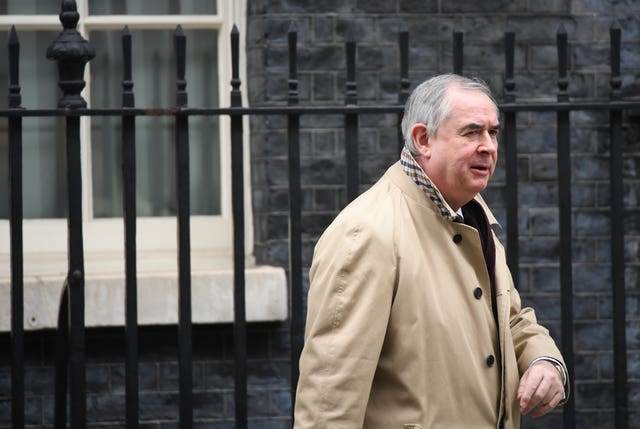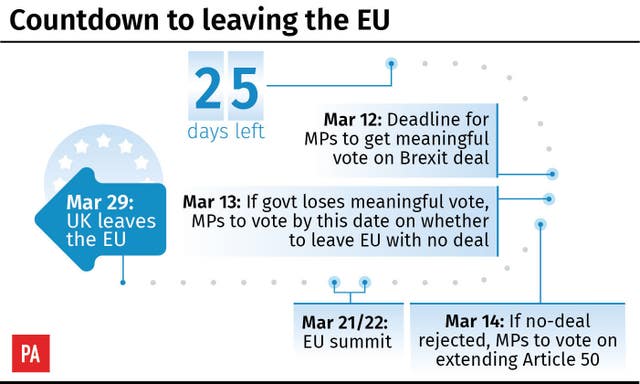The UK is still – officially – expected to leave the European Union on March 29.
But with the prospect of Brexit Day being delayed, key questions remain unresolved.

– What is happening in Brussels?
Attorney General Geoffrey Cox is back in Brussels on Tuesday as he continues efforts to find legal assurances over the temporary nature of the backstop arrangements for the border with Ireland. Brexit Secretary Stephen Barclay will also be present for the talks with the EU’s Michel Barnier.
The Daily Telegraph reported that Mr Cox has abandoned efforts to secure either a fixed time limit for the measures or a unilateral exit mechanism which would allow the UK to terminate the arrangements which Brexiteers fear will trap the UK within the EU’s customs union.
Whatever concessions he does manage to secure in Brussels will be closely scrutinised by Tory and DUP Eurosceptics before Theresa May faces a showdown with MPs over the revised deal.

– What is happening in Westminster?
The Prime Minister has promised to bring her revised Withdrawal Agreement and Political Declaration back for another “meaningful vote” by March 12 at the latest. The last time her Brexit deal was voted on by MPs, Mrs May suffered a humiliating 230-vote defeat.
Labour has indicated it will use the meaningful vote to support a call for a referendum on a Brexit deal.
If Mrs May’s deal is rejected again, MPs will vote by March 13 at the latest on whether they want to leave the EU without a deal.
Should MPs reject a no-deal Brexit, there will be another vote on March 14 on whether Parliament wants to seek a “short, limited extension to Article 50” – delaying the UK’s departure beyond the current March 29 deadline.
The aim of a delay would be to give extra time to reach an agreement with Brussels that can be accepted by MPs, but Mrs May stressed that it would not take the prospect of a no-deal Brexit off the table, but would instead create a new deadline.
– How could Brexit be delayed and for how long?
To secure an extension to Article 50, Mrs May would need the support of the 27 other EU states. They are likely to agree to an extension as long as there was a prospect of a deal being reached – or a referendum or general election which could change the political picture at Westminster.
The looming European elections in May present a problem, with the UK currently not expected to take part.
That would limit any extension of the UK’s membership of the EU until the end of June, as the newly-elected parliament sits in July.
If a longer extension was sought, that would mean taking part in the elections, something likely to fuel Eurosceptic anger – and potentially see Nigel Farage standing for the new Brexit Party.
-So what happens on March 29?
Impossible to say at this stage. If there is a deal, with a transition period, then although the UK will formally leave the EU at 11pm, very little will change.
If there is a delay, the UK will still be in the European Union until the extension period expires.
But if there is a no-deal Brexit, things are a lot more uncertain – the Government has been ramping up preparations to try to prevent shortages of food and medicine amid fears that increased bureaucracy will clog up key ports where goods arrive from the Continent.
David Hughes, Press Association Chief Political Correspondent
Thanks for signing up to Minutehack alerts.
Brilliant editorials heading your way soon.
Okay, Thanks!

